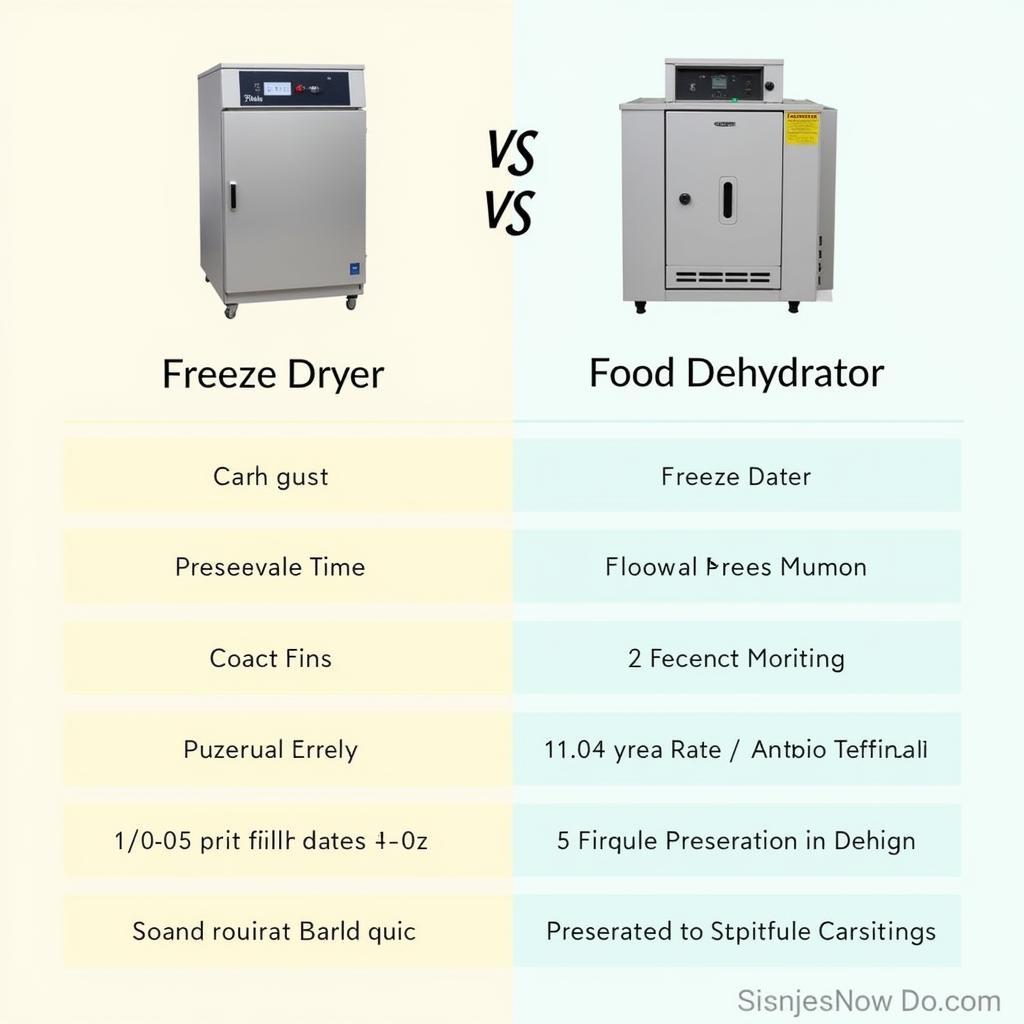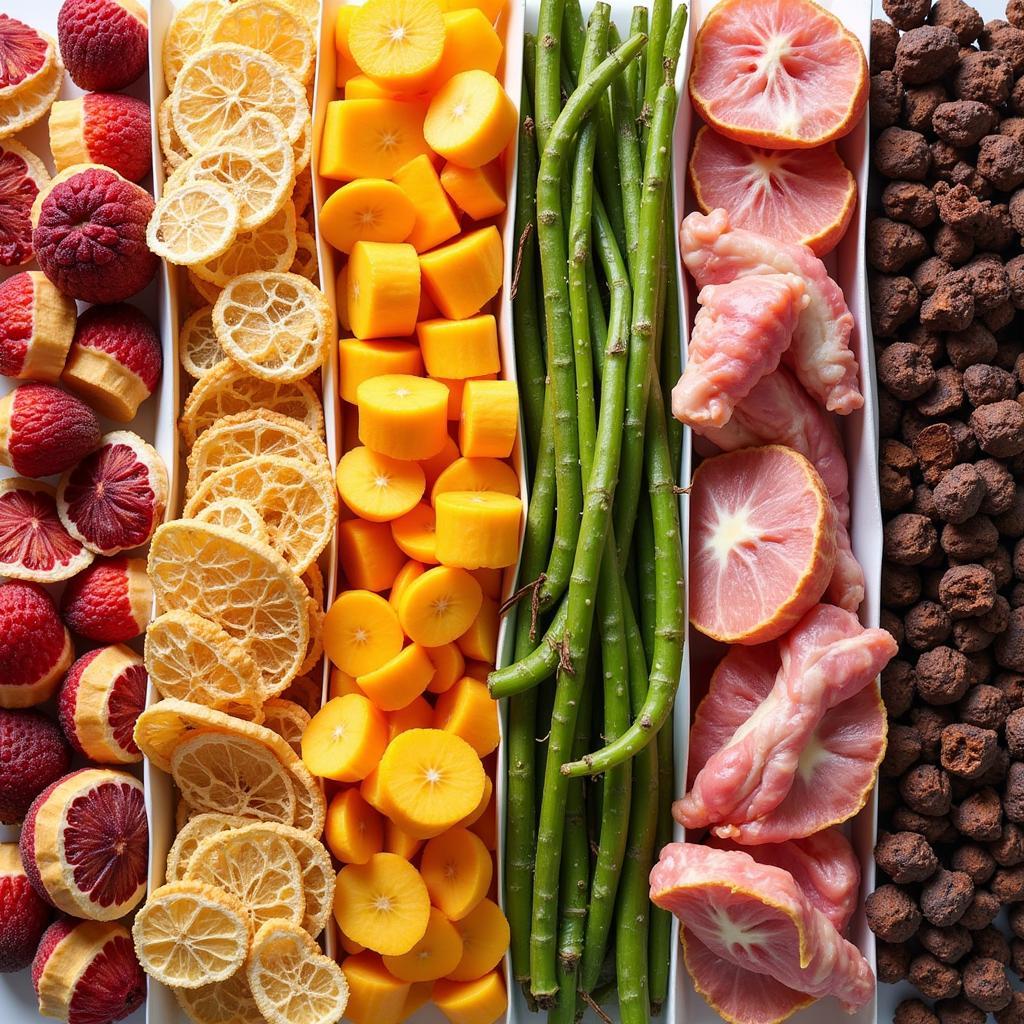Freeze drying vs food dehydration, what’s the difference? Both methods preserve food by removing moisture, but the processes and results are distinct. Understanding these differences is crucial for choosing the best preservation method for your needs, whether you’re a seasoned backpacker, a prepper, or just looking to extend the shelf life of your garden harvest.  Freeze Dryer vs Food Dehydrator Comparison Chart
Freeze Dryer vs Food Dehydrator Comparison Chart
Understanding Food Dehydration
Dehydration is the oldest and most accessible method of food preservation. It works by removing moisture from food using warm air, effectively inhibiting microbial growth and extending shelf life. Think sun-dried tomatoes or beef jerky; these are classic examples of dehydrated foods. Dehydrators offer a controlled environment for this process, allowing for even drying and preventing spoilage. They are relatively inexpensive and easy to use, making them a popular choice for home food preservation.
Dehydration significantly reduces the weight and volume of food, making it ideal for food camper and backpackers. However, the process can impact the flavor, texture, and nutritional value of food. While dehydrated food is shelf-stable, it often requires rehydration before consumption.
Exploring Freeze Drying: A Deep Dive
Freeze drying, also known as lyophilization, is a more sophisticated preservation method. It involves freezing the food, then lowering the pressure and adding heat to allow the frozen water in the food to sublimate, meaning it transitions directly from ice to vapor without melting. This process preserves the food’s original shape, texture, and nutrients far better than dehydration. Freeze-dried food also rehydrates much faster and more completely, often retaining its original flavor and appearance.
While freeze drying offers superior preservation quality, it comes at a higher price. Freeze dryers are significantly more expensive than dehydrators and require more energy to operate. Despite the higher cost, many consider the benefits, particularly the superior quality of the preserved food, to be worth the investment.
Freeze Dryer vs. Food Dehydrator: Head-to-Head Comparison
How does a food dehydrator vs freeze dryer actually stack up? Let’s break it down:
- Cost: Dehydrators are significantly cheaper than freeze dryers.
- Preservation Time: Dehydration takes several hours, while freeze drying can take 24 hours or more.
- Nutrient Retention: Freeze drying retains a higher percentage of nutrients compared to dehydration.
- Shelf Life: Both methods significantly extend shelf life, but freeze-dried food generally lasts longer.
- Texture: Freeze-dried food retains its original texture better than dehydrated food.
- Flavor: Freeze drying preserves flavor better than dehydration.
- Ease of Use: Dehydrators are generally easier to use than freeze dryers.
“When preserving delicate fruits like berries, I always opt for freeze drying,” says renowned food scientist, Dr. Amelia Carter. “The process beautifully maintains the integrity of their structure and flavor profile, which is often lost with traditional dehydration.”
Which Method is Right for You?
Choosing between a food freeze dryer vs dehydrator depends on your individual needs and priorities. If you’re on a budget and looking for a simple way to preserve basic foods, a dehydrator is a good choice. However, if quality is your top priority and you’re willing to invest more, a freeze dryer is the way to go.
 Freeze-Dried vs Dehydrated Food Examples
Freeze-Dried vs Dehydrated Food Examples
Conclusion
Both freeze drying and dehydration are effective methods for preserving food, offering distinct advantages and disadvantages. Understanding the freeze drying vs dehydrating food comparison is key to selecting the best method for your needs. Whether you prioritize cost-effectiveness, ease of use, or superior preservation quality, making an informed decision will help you enjoy the benefits of preserved food for years to come.
FAQ
- What foods are best for freeze drying?
- Can you freeze dry meat?
- How long does freeze-dried food last?
- Is freeze-dried food healthy?
- What is the cost difference between a freeze dryer and a dehydrator?
- What are the best foods to dehydrate?
- How do I store dehydrated food?
For support, please contact us at Phone Number: 02437655121, Email: minacones@gmail.com Or visit us at: 3PGH+8R9, ĐT70A, thôn Trung, Bắc Từ Liêm, Hà Nội, Việt Nam. We have a 24/7 customer service team.